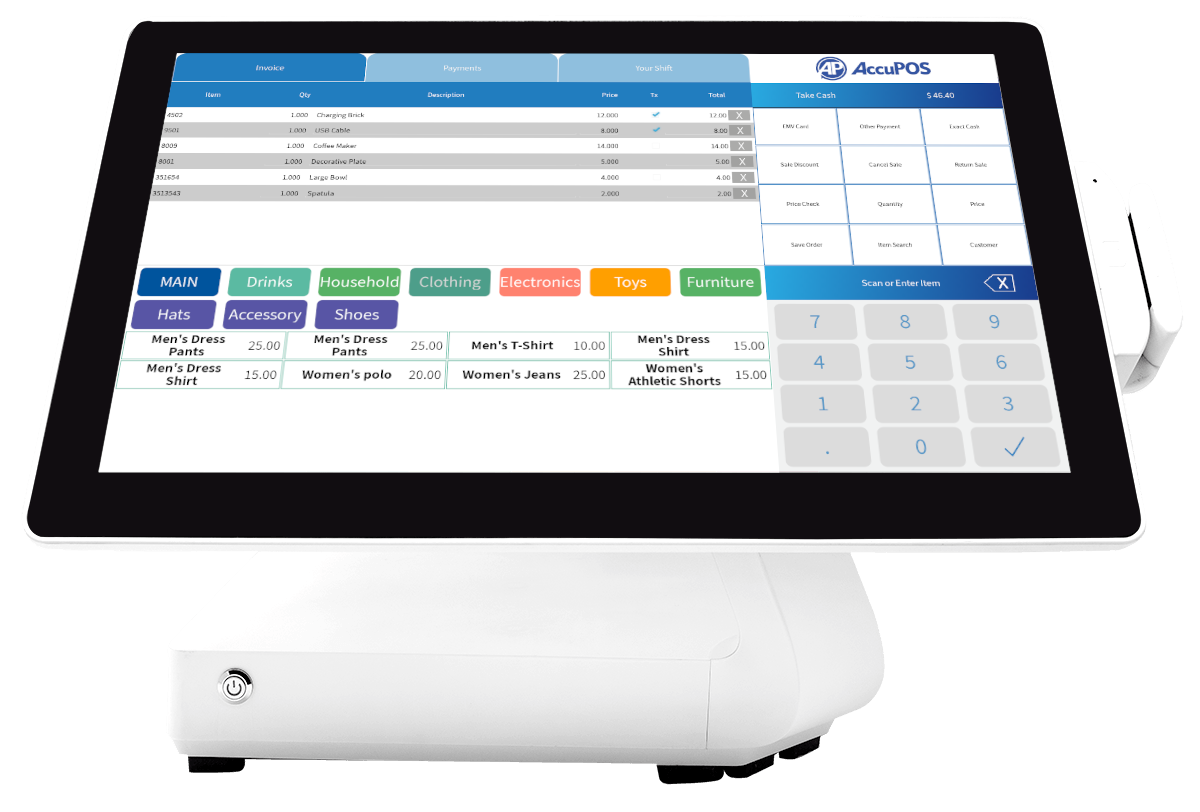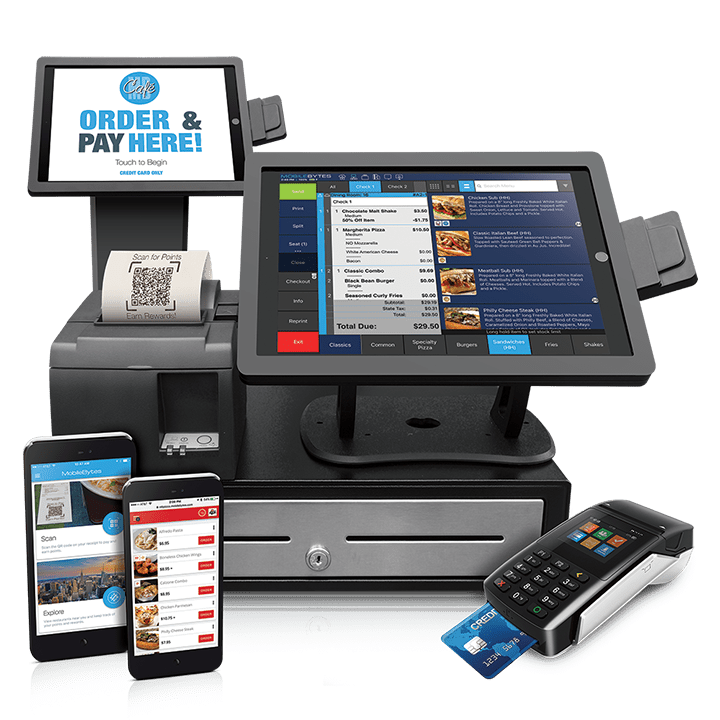Unknown Facts About Point Of Sale Software
Unknown Facts About Point Of Sale Software
Blog Article
The Ultimate Guide To Restaurant Pos

Point of Sale: Retail Point-Of-Sale Solutions Streamline Deals
Facts About Pos Uncovered

Hardware Parts of a Point of Sale System What makes a POS system tick? It's not just software; the hardware plays a starring role. Think about it as the body to the software's brain. Without the best hardware, even the most advanced POS software is simply a pretty face. Vital POS Hardware So, what are the must-haves? Let's simplify. The central processing unit, often a computer system or tablet, is the heart of the operation. The display or touchscreen show permits staff to communicate with the system. A barcode scanner accelerate the checkout procedure. Keep in mind the days of manually entering each code? The reliable invoice printer offers clients with a record of their purchase. A cash drawer keeps your cash safe and organized. A card reader permits consumers to pay with credit or debit cards. Diving Deeper: Beyond the Essential But wait, there's more! Depending on your company, you may require specific hardware. For example, a dining establishment might incorporate cooking area printers to relay orders, while a retail store may use label printers for product tagging. Ever question how your regional pastry shop quickly prints those delicious-looking labels? Picking the Right Hardware: A Balancing Act Picking the right hardware isn't practically purchasing the most costly devices. It's about discovering the sweet area between performance, toughness, and budget plan. A click here little business simply starting might choose a more basic setup, while a high-volume merchant will require robust, high-performance makers. Is it much better to buy brand-new or utilized? Consider your choices carefully. A brand-new system uses the most recent innovation and service warranty security, however a refurbished system can save you money. The Future of POS Hardware What does the future hold? Expect to see much more combination with mobile devices, biometric scanners for staff member authentication, and advanced analytics dashboards displayed on larger, clearer screens. Envision a world where inventory is automatically upgraded in real-time as products are scanned-- a world where you can track your best-selling item from throughout the world. The possibilities are limitless, and the hardware is continuously developing to satisfy the needs these days's businesses. Are you ready to update your point of sale system?
Software Application Characteristics and Capabilities: The Heart of Your POS System
Ever watch an experienced barista move through a busy morning rush? Their secret isn't simply caffeine; it's a seamless dance with their POS system. The software is the conductor of your service symphony, managing everything from sales to inventory. What notes should you be listening for? What capabilities truly matter in today's market?
Inventory Management: Beyond Counting Beans
Forget spreadsheets that haunt your dreams. Modern POS systems offer real-time stock tracking, informing you when your stock of artisanal coffee beans dips precariously low. Consider it as a digital guardian angel, avoiding those awkward "Sorry, we're out!" moments to consumers. What if you could likewise forecast need based upon historical data? Numerous systems now use forecasting tools, a powerful weapon against overstocking and lost sales. This assists prevent the situation of running out of popular items or accumulating excess stock of slow-moving products, both of which can constrain capital and area.
Sales Reporting and Analytics: Decoding the Information
Sales data is the brand-new gold, and your POS system is the miner. Forget feeling in one's bones how much you offered today. Dive deep into the data to reveal patterns, determine your best-selling items, and understand client behavior. Which menu item pairs completely with the everyday special? Which promotion resonated most with your clients? These insights are not simply fascinating; they're actionable intelligence. Without dependable sales reporting, navigating the complexities of organization decision-making becomes like sailing without a compass, increasing the chance of errors and missed opportunities.
Consumer Relationship Management (CRM): Structure Bridges, Not Walls
Keeping in mind a regular consumer's name and favorite order is lovely, but scaling that individual touch is challenging. POS systems with CRM abilities permit you to track customer purchase history, choices, and even birthdays. Think of immediately providing a discount on their birthday-- a small gesture that cultivates loyalty and encourages repeat business. There is the prospective snag of bad information quality, which can lead to unreliable customer profiles and ineffective marketing efforts.
Payment Processing: Streamlining the Deal
The checkout experience can make or break a sale. Smooth integration with various payment approaches-- credit cards, mobile wallets, even copyright-- is non-negotiable. Can your system handle split payments? Does it use safe tokenization to secure client data? A cumbersome payment procedure is like hitting a sour note in your organization symphony, potentially disrupting the entire performance. Ensuring compatibility with progressing payment innovations and adherence to security standards are paramount for keeping client trust and functional performance.
Staff Member Management: Keeping the Team in Sync
From clocking in and out to managing authorizations and tracking performance, employee management includes streamline operations and enhance accountability. Is scheduling a problem? Many POS systems use integrated scheduling tools, enhancing staffing levels based on predicted demand. A typical obstacle that is frequently overlooked is the challenge of incorporating employee management functionalities with payroll systems, which can result in errors and inefficiencies in wage calculations.
Advanced Features: Leveling Up Your Operations
- Table Management: Ideal for restaurants, this feature enables you to visualize your dining-room, track table status, and handle reservations.
- Loyalty Programs: Reward your best clients and encourage repeat service with incorporated commitment programs.
- Online Ordering Integration: Effortlessly incorporate your POS system with online buying platforms to expand your reach.
Choosing the ideal POS system has to do with more than simply performance; it has to do with discovering a partner that can grow with your company. Consider your existing requirements, anticipate future development, and don't be afraid to ask the hard concerns. The ideal software application can transform your organization from a chaotic cacophony into an unified masterpiece.
Industry-Specific POS System Applications
Believe of the local bakeshop, dynamic with early morning customers yearning fresh croissants. A generic POS system might deal with transactions, however can it manage intricate recipes, track component stock, or instantly adjust production schedules based on sales data? Most likely not. That is where the charm of industry-specific POS systems shines.
Restaurants and Hospitality
For dynamic dining establishments, speed and accuracy are paramount. The number of times have you seen servers handling orders, modifications, and splitting expenses, all while attempting to offer outstanding service? A restaurant POS system enhances these procedures, enabling table management, kitchen order tickets, and even online buying combination. These systems often include functions like ingredient-level inventory tracking, vital for managing food expenses and decreasing waste. Ever question why your preferred dish is sometimes unavailable? It may originate from an absence of proper stock management.
- Table Management
- Kitchen Order Tickets
- Online Purchasing Combination
- Ingredient-Level Inventory Tracking
Retail Solutions
Retail, with its varied stock and client interactions, requires a various set of tools. Imagine a store clothing shop having a hard time to keep track of sizes, colors, and seasonal collections using a fundamental checkout system. An industry-specific retail POS system uses functions like barcode scanning, consumer commitment programs, and in-depth sales reporting. These systems can even incorporate with e-commerce platforms, supplying a smooth omnichannel experience for clients. Did you know some retail POS systems can predict future sales trends based upon historic information? Now that is effective!
The Dangers of a Mismatch
Choosing the wrong POS system can create considerable operational obstacles. A clothes boutique utilizing a restaurant POS, for example, would discover it unsuitable for managing stock with sizes and colors. The lack of correct reporting and analytics could cause mistaken acquiring decisions and lost earnings. The result could be similar to attempting to fit a square peg in a round hole.
Key Factors to consider
Selecting an industry-specific POS system needs careful assessment. Think of your service's special needs and operational workflows. Does the system integrate with existing software? Does it offer the needed reporting capabilities? Is it scalable to accommodate future development? A well-chosen POS system is not simply a deal tool; it's a strategic property that can drive performance, enhance customer complete satisfaction, and ultimately, increase your bottom line. Remember, it is an investment in your organization's future, not simply an expense.
Security Factors To Consider for Point of Sale Systems
Ever heard the tale of the mom-and-pop store that lost whatever since of a single, neglected security flaw in their POS system!.?. !? It's a cautionary tale, and it highlights a vital element typically overshadowed by the appeal of fancy functions and streamlined operations. The truth is, a POS system is only as excellent as its security. What excellent is a system that crunches numbers in a flash if it allows lawbreakers to swipe customer's data just as rapidly?
The Vulnerability Minefield
The digital landscape is a battlefield. Every POS system, regardless of size or elegance, is a prospective target. Are you genuinely prepared for the dangers prowling around the corner? The genuine pinch comes when you find that your outdated software has an open hole that hackers can exploit, turning your service into an unwitting accomplice in identity theft. The problem is that hackers are crafty and are always changing their techniques.
Common Security Spaces and Expert Tips
- Weak Passwords: "Password123" isn't sufficing. Use strong, special passwords for all POS system accounts and change them routinely. Two-factor authentication is a must.
- Unsecured Networks: Your Wi-Fi resembles leaving the front door open. Protect your network with strong file encryption (WPA3 if possible) and consider a separate network for your POS system.
- Outdated Software: Software application vendors patch security holes all the time. Failing to upgrade resembles welcoming trouble. Establish automated updates or schedule routine maintenance.
- Worker Training: Your staff is your very first line of defense. Train them to acknowledge phishing attempts, protect passwords, and report suspicious activity.
Data Encryption: Your Guard Against the Dark Arts
Consider data encryption as a secret code. It scrambles sensitive info, like charge card numbers, making it unreadable to unauthorized users. Without file encryption, your consumers' financial information are like sitting ducks, ripe for the picking by cybercriminals. It's not simply about safeguarding your consumers; it has to do with protecting your reputation and avoiding significant fines.
PCI Compliance: The Rulebook You Can't Disregard
If you accept charge card, you're bound by the Payment Card Industry Data Security Standard (PCI DSS) It's a set of security standards designed to safeguard cardholder information. Stopping working to comply can lead to fines, penalties, and even the loss of your capability to process charge card payments. It's a headache, yes, but it's a necessary one. Think about PCI compliance as the cost of doing service in the digital age.
Consider this: every deal processed through your point of sale is a possible entry point for harmful stars. By executing robust security procedures, you're not simply protecting your company; you're protecting your consumers' trust and ensuring the long-term viability of your operations. The security of your POS system isn't just a technical concern; it's an organization vital. It needs consistent caution, proactive steps, and a commitment to remaining ahead of the curve.